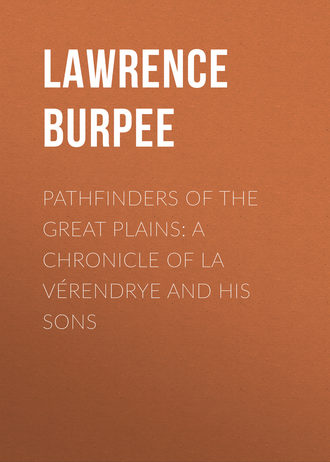 полная версия
полная версияPathfinders of the Great Plains: A Chronicle of La Vérendrye and his Sons
Meanwhile Saint-Pierre had remained at Fort La Reine, leaving the work of exploration to his young lieutenant, Niverville. One incident of his life there remains to be described before we close this story of the search for the Western Sea. It cannot be better told than in Saint-Pierre's own narrative:
On February 22, 1752 [he says], about nine o'clock in the morning, I was at this post with five Frenchmen. I had sent the rest of my people, consisting of fourteen persons, to look for provisions, of which I had been in need for several days. I was sitting quietly in my room, when two hundred Assiniboines entered the fort, all of them armed. These Indians scattered immediately all through the place; several of them even entered my room, but unarmed; others remained in adjacent parts of the fort. My people came to warn me of the behaviour of these Indians. I ran to them and told them sharply that they were very impudent to come in a crowd to my house, and armed. One of them answered in the Cree language that they came to smoke. I told them that they were not behaving properly, and that they must leave the fort at once. I believe that the firmness with which I spoke somewhat frightened them, especially as I put four of the most resolute out of the door, without their saying a word.
I went at once to my room. At that very moment, however, a soldier came to tell me that the guard-house was full of Indians, who had taken possession of the arms. I ran to the guard-house and demanded, through a Cree interpreter, what they meant by such behaviour. During all this time I was preparing to fight them with my weak force. My interpreter, who proved a traitor, said that these Indians had no bad intentions. Yet, a moment before, an Assiniboine orator, who had been constantly making fine speeches to me, had told the interpreter that, in spite of him, the Indians would kill and rob me.
When I had barely made out their intentions I failed to realize that I ought to have taken their arms from them. [To frighten them] I seized hold of a blazing brand, broke in the door of the powder magazine, and knocked down a barrel of gunpowder. Over this I held the brand, and I told the Indians in an assured tone [through the interpreter] that I expected nothing at their hands, and that even if I was killed I should have the glory of subjecting them to the same fate. No sooner had the Indians seen the lighted brand, and the barrel of gunpowder with its head staved in, and heard my interpreter, than they all fled out of the gate of the fort. They damaged the gate considerably in their hurried flight. I soon laid down my brand, and then I had nothing more exciting to do than to close the gate of the fort.
Soon after this incident with the Assiniboines, Saint-Pierre gave up his half-hearted attempt to find a route to the Western Sea, and returned to Montreal. He had proved himself a brave man enough. He did not, however, understand, and made no attempt to understand, the character of the Indians, and, as an explorer, he was a complete failure. In a couple of years he managed to undo all the work which La Vérendrye had accomplished. After he abandoned the West, the forts which had been built there with such difficulty and at such great expense soon fell into decay. The only men who had the knowledge and the enthusiasm to make real La Vérendrye's dream of exploration, his own sons, were denied the privilege of doing so; and no one else seemed anxious even to attempt such a difficult task.
The period of French rule in Canada was now rapidly drawing to a close. Instead of adding to the territories of France in North America, her sons were preparing to make their last stand in defence of what they already possessed. Half a dozen years later their dream of western exploration, and of a great North American empire reaching from the Atlantic to the Pacific, came to an end on the Plains of Abraham. It was left for those of another race who came after them to turn the dream of their rivals into tangible achievements. It must never be forgotten, however, that, although Pierre de La Vérendrye failed to complete the great object of his ambition, we owe to him and his gallant sons the discovery of a large part of what is to-day Western Canada.
BIBLIOGRAPHICAL NOTE
An English translation of The Journals of La Vérendrye edited by Lawrence J. Burpee, with the French text, will be found among the publications of the Champlain Society. The reader should consult also Parkman, A Half Century of Conflict, chapter xvi.; Burpee, The Search for the Western Sea; Shortt and Doughty (editors), Canada and Its Provinces, vol. i., 'The Pathfinders of the Great West.'
1
See The 'Adventurers of England' on Hudson Bay, pages 73-88.
2
This tablet remained buried where it was deposited for 170 years. In March 1913 it was found by a young girl on the west bank of the Missouri river opposite the city of Pierre, N. Dakota, thus bearing testimony to the trustworthiness of François La Vérendrye's journal, from which this chapter was written before the tablet was discovered. Photographs of the tablet were made by W. O'Reilly of Pierre and published in the Manitoba Free Press and are reproduced in this book by courtesy of Charles N. Bell, F.R.G.S., of Winnipeg.



